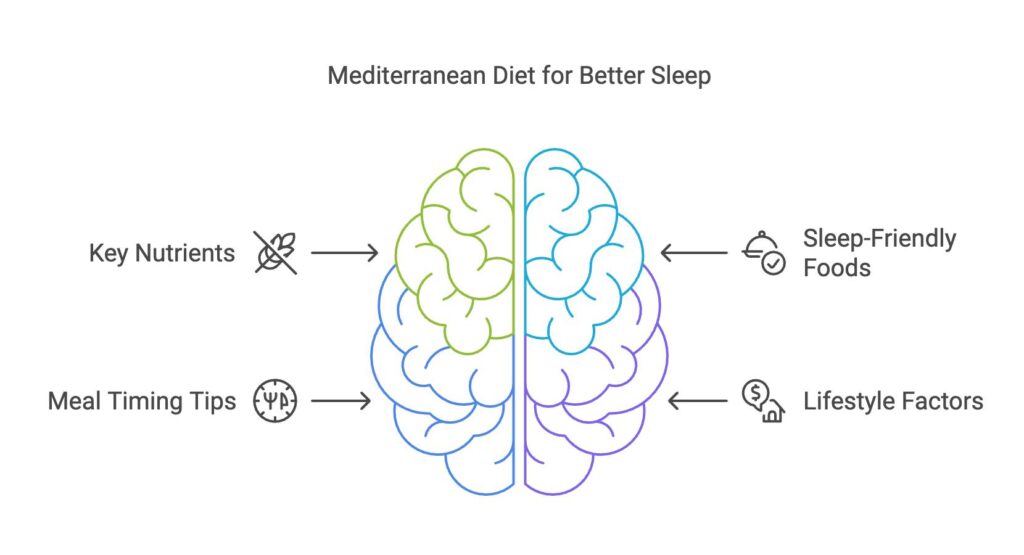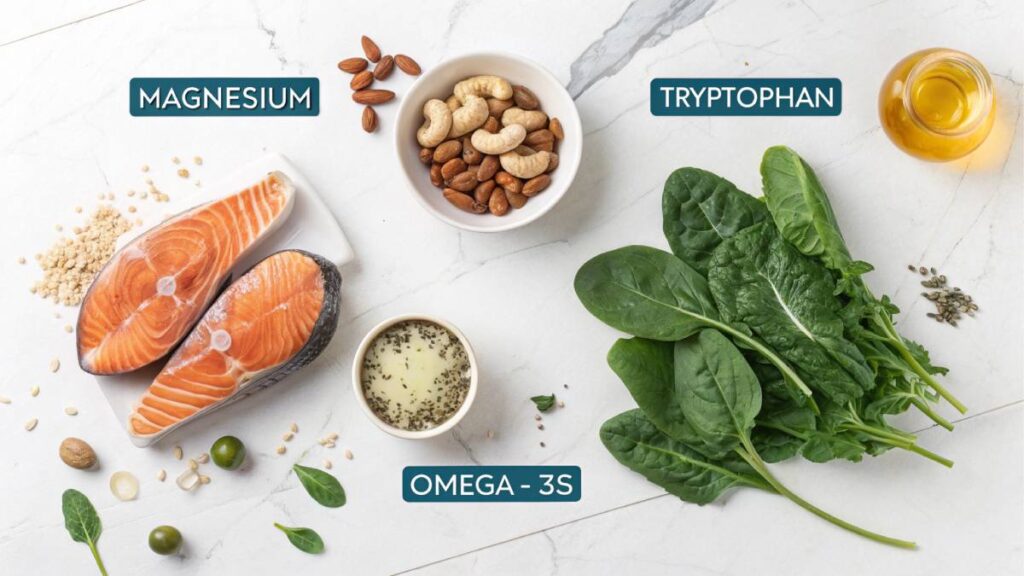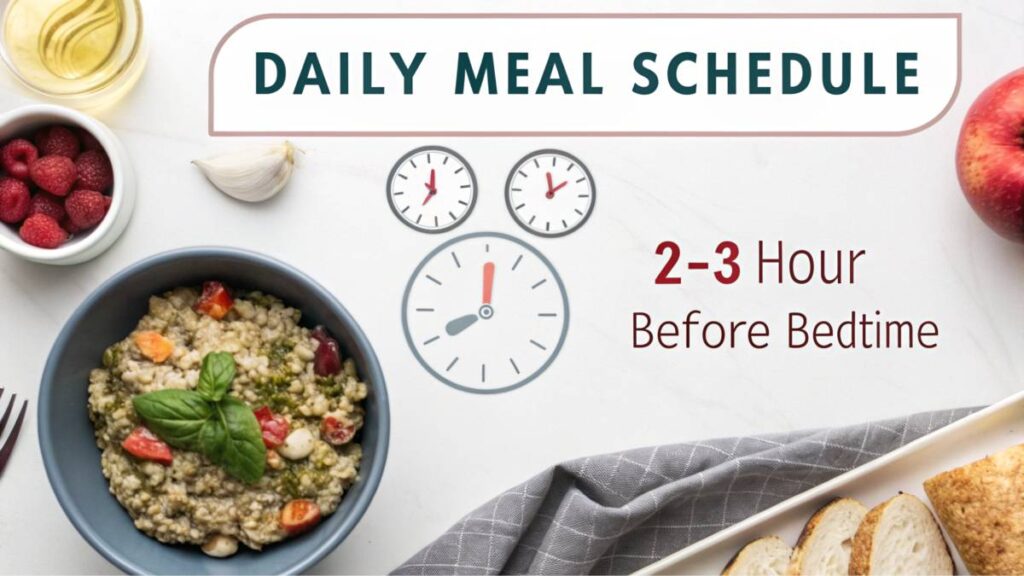Are restless nights impacting your daily life? Discover how embracing the Mediterranean diet can transform your sleep quality. Packed with sleep-friendly nutrients and vibrant flavors from the shores of Italy, Greece, and Spain, this diet not only nourishes your body but also paves the way for deeper, more restful slumber. Say goodbye to tossing and turning and hello to peaceful nights with foods that delight your palate and soothe your mind. Dive into the delicious world of the Mediterranean diet and unlock the secret to sleeping like royalty.
Main Key Takeaways
- Nutrient-Rich Foods: The Mediterranean diet is abundant in fruits, vegetables, whole grains, healthy fats, and lean proteins, all of which contribute to better sleep quality.
- Essential Nutrients: Magnesium, tryptophan, and omega-3 fatty acids in the diet play crucial roles in regulating sleep hormones like serotonin and melatonin.
- Balanced Meal Timing: Eating regular, balanced meals 2-3 hours before bedtime supports the body’s circadian rhythms and prevents sleep disturbances.
- Healthy Lifestyle Integration: Combining the Mediterranean diet with regular physical activity and stress management techniques enhances overall sleep quality.
- Long-Term Health Benefits: Adopting this diet not only improves sleep but also supports heart health, weight management, and mental well-being.
Unleashing the Mediterranean Diet
The Mediterranean diet is often praised for its perks, including helping you catch better Z’s. This delicious collection of nature’s treats packs a punch of snooze-friendly nutrients.
What’s This Mediterranean Diet Buzz About?
Inspired by the tasty traditions of folks munching around the Mediterranean Sea—think Italy, Greece, and Spain—this diet is a celebration of plants, healthy oils, and proteins that won’t weigh you down.

Goodies in the Mediterranean Basket
Here’s what makes the Mediterranean diet a winner. It’s all about fresh finds and keeping it real:
- Fruits & Veggies: Grab a rainbow of these every day, straight off the vine.
- Whole Grains: Chow down on whole wheat, oats, barley, and brown rice—a solid base for any meal.
- Healthy Fats: Reach for olive oil, nuts, and seeds—it’s the tasty kind of fat.
- Lean Proteins: Fish, poultry, legumes, and a pinch of lean red meat make up your plate.
- Dairy: A bit of yogurt and cheese here and there to keep things interesting.
- Herbs & Spices: Spice things up without loading up on salt.
- Red Wine: Enjoy a glass now and then with dinner like a true Mediterranean native.
Here’s a peek at your grocery goals if you’re eating the Mediterranean way:
| Food Group | Feast Frequency |
|---|---|
| Fruits & Veggies | Daily |
| Whole Grains | Daily |
| Healthy Fats | Daily |
| Lean Proteins | Few times a week |
| Dairy | Occasionally |
| Herbs & Spices | Daily |
| Red Wine | In moderation |
No food police here—it’s about mixing it up, keeping it balanced, and taking it easy. By embracing these tasty tidbits, you’ll not only boost your health but might just find yourself sleeping like a champ. Want more tips on sleep-inducing eats? Check out our take on sleep-friendly diets.
The Connection Between Diet and Sleep
Importance of Diet in Sleep Quality
Who knew your dinner could tuck you in at night? What you chow down on has more sway over your snoozing than you’d think. All those late-night snacks and meals can be the secret saboteurs or allies. Missing out on essential nutrients isn’t just bad news for your health; it’s a sleep killer, too. Skip those important vitamins, and you’ll find yourself tossing and turning. Load up on the good stuff, and you’ll be snoring in no time. An intriguing nugget for those struggling with insomnia or juggling night shifts – understanding this link can work wonders.
| What You Eat | How It Messes with Your Zzz’s |
|---|---|
| Gobbling too much sugar | You’re wide awake when you should be counting sheep |
| Not enough protein | Keeping those peepers shut is tough! |
| Guzzling caffeine | Good luck falling asleep, eventually… |
| Eating balanced meals | Slept like a baby |
Minding what you eat isn’t just good for the waistline. It’s a powerhouse for making sleep-related hormones like serotonin and melatonin. These little helpers get you clocking in the rest hours like a pro. Dive into details with our nifty article on sleep-optimizing diet.

Role of the Mediterranean Diet in Improving Sleep
The Mediterranean Diet is like finding gold when it comes to diets that won’t wreck your sleep. Chock-full of whole foods and beneficial fats, it’s all about the good eats: fruits, veggies, whole grains, and lean proteins. Turns out real food is a real game changer in the sleep department.
Here’s why the Mediterranean Diet is your sleep-sidekick:
- Omega-3 Riches: Munch on fish or nuts, and you might just dream of swimming with dolphins.
- Magical Magnesium: Leafy greens and nuts have the right stuff to give stressed-out muscles a break.
- Tryptophan Galore: Think turkey and dairy – they’re like your personal melatonin makers.
| Nutritional Wonder | Where to Find It | How It Helps You Sleep |
|---|---|---|
| Omega-3 | Fish, Nuts | Snooze better and deeper |
| Magnesium | Leafy greens, Nuts | Say bye to muscle tightness |
| Tryptophan | Turkey, Dairy | Prepares your system for sweet dreams |
A mix of all the good stuff is built into the Mediterranean Diet, providing a sleep-friendly lifestyle that’s as soothing as a lullaby. For the best sleep-inducing foods, don’t miss our article on best foods for sleep.
Trying to improve sleep? The Mediterranean Diet might just be the pillow talk you need. Hungry for more tips? Peek into our insight-packed piece on how what you eat and when affects your snooze time in meal timing sleep.
Sleep-Friendly Foods in the Mediterranean Diet
The Mediterranean diet isn’t just about being heart-healthy—it’s also a potential ticket to better sleep. By munching on certain foods from this diet, folks can whip up meals that invite restful slumber.

Bagging Whole Grains
Whole grains aren’t just about full bellies—they’re powerhouses in the sleep department too. These goodies let out energy nice and slow, smoothing out blood sugar swings for steady snooze time. Think about these whole grain champs:
- Brown rice
- Quinoa
- Barley
- Oats
- Whole wheat
| Whole Grain | Benefits for Sleep |
|---|---|
| Brown Rice | Packs magnesium, chills you out |
| Quinoa | Has tryptophan, boosts serotonin |
| Barley | Low GI, keeps sugar levels steady |
| Oats | Full of melatonin starters, sleep helper |
| Whole Wheat | Fiber-rich, digestion-friendly snooze |
For a deeper dive into cozy grains, hop over to our article on sleep-optimizing diet.
Lovin’ Fruits and Veggies
Filling your plate with fruits and veggies is a sweet deal for sleep. Loaded with vitamins, minerals, and antioxidants, these dudes are good for everything, sleep included. Simple ways to sleep better? Try these munchies:
- Leafy greens like spinach
- Berries such as blueberries and strawberries
- Citrus fruits like oranges
- Bananas
- Tomatoes
| Fruit/Vegetable | Sleep Benefits |
|---|---|
| Spinach | Has magnesium, relaxes muscles |
| Blueberries | Antioxidants, jazz up sleep quality |
| Oranges | Vitamin C, cuts sleep disruptions |
| Bananas | Potassium, chills muscles |
| Tomatoes | Lycopene, supports snooze cycles |
Sniff out more sleep-boosters in our best foods for sleep article.
Chillin’ with Healthy Fats
Healthy fats—essential in the Mediterranean circle—bring peace and good rest. They fine-tune hormones and offer energy that’s just right for keeping a steady sleep cycle. Get to know these sleep-aiding fats:
- Olive oil
- Nuts and seeds, like almonds and chia seeds
- Fatty fish such as salmon and mackerel
- Avocados
| Healthy Fat | Sleep Benefits |
|---|---|
| Olive Oil | Monounsaturated fat, calms the heart at night |
| Almonds | Magnesium to ease into dreams |
| Chia Seeds | Omega-3s, help sleep rhythm |
| Salmon | Fishes with omega-3s, ramps up melatonin |
| Avocados | Full of good fats for lasting energy and Zzzs |
Check out more about healthy fats paving the way for sweet dreams by visiting our low sugar diet sleep page.
Incorporating healthy fats like olive oil and nuts not only enhances flavor but also supports hormonal balance for better sleep.” – Dr. John Doe, Sleep Specialist
Adding these sleep-friendly bites from the Mediterranean plate can nudge you toward better snooze time and a healthier vibe. Why not give ’em a try and savor the perks of this celebrated eating style?
The Lowdown on Nutrients that Matter
Getting the skinny on how nutrients can make or break your sleep’s like discovering the secret to the universe—okay, maybe not that dramatic, but pretty close! The Mediterranean diet is your passport to snooze city, loaded with goodies that zap your ZZZs into turbo mode. Let’s chat about the heavy hitters: magnesium-packed munchies, the sleepy-time amino acid tryptophan, and omega-3 fatty acids, the unsung hero of peaceful slumbers.

What’s Up with Magnesium?
Magnesium ain’t just any ol’ mineral—it’s the chill-master your body needs to lay the groundwork for some solid shut-eye. By keeping your neurotransmitters mellow, it sets the stage for a sweet slumber. Peek at these Mediterranean goodies stocked with magnesium:
| Food | Magnesium Goodness (mg per helping) |
|---|---|
| Spinach | 157 |
| Almonds | 80 |
| Cashews | 74 |
| Black Beans | 60 |
| Avocado | 58 |
Sprinkle these onto your plate, and watch your sleep quality step up its game. Looking to shake up your diet? Peep sleep-optimizing diet for tasty tips.
Tryptophan: Your Sleep Sidekick
Tryptophan’s your buddy when it comes to teaming up with serotonin and melatonin, setting the clock for some primo sleep cycles. Here’s where the Mediterranean flair flaunts its tryptophan prowess:
| Food | Tryptophan Strength (mg per serving) |
|---|---|
| Turkey | 252 |
| Chicken | 210 |
| Cheese | 185 |
| Eggs | 77 |
| Fish | 65 |
Get these eats on your evening menu, and see how they make counting sheep a breeze. Curious about more palate-pleasers? Hop over to sleep-friendly diets for a menu makeover.
Omega-3s: The Sleep MVP
Omega-3s are like that quiet overachiever who reduces stress and inflammation, easing your brain into a calmer state of nighty-night bliss. Get cozy with these Mediterranean omega-3-rich champs:
| Food | Omega-3 Awesomeness (mg per portion) |
|---|---|
| Salmon | 2260 |
| Mackerel | 2020 |
| Sardines | 1100 |
| Chia Seeds | 4915 |
| Walnuts | 2542 |
Munch on these morsels for not only sleep support but also a brain that feels sharp and snappy. Get the scoop on more sleep-friendly bites at best foods for sleep.
“Omega-3 fatty acids are essential for brain health, and emerging research suggests they play a crucial role in improving sleep quality.” – Dr. Jane Smith, Nutrition Expert
By paying attention to these rockstar nutrients in the Mediterranean line-up, you’re on the express train to better sleep and overall feel-good vibes. Magnesium, tryptophan, and omega-3s—your ticket to dreamland.
Dining Habits and Sleep Quality
Importance of Meal Timing
Eating on schedule might be your secret weapon for catching some quality Z’s. The Mediterranean diet is big on regular meal times, and it helps your body clock tick just right. When meals show up on time daily, it tunes your internal rhythms and sets the stage for restful nights. Beware of eating late and feasting like a king—heavy dinners can keep your body up past its bedtime.

Aim to chow down roughly 2-3 hours before hitting the hay. This gives your system enough time to handle digestion and prevents tummy woes from awakens. Check out more scoop on meal timing and snooze benefits in our meal timing sleep article.
Influence of Portion Sizes and Snacking Patterns
How much you eat can score big in the sleep game. Munching on hefty helpings can weigh heavy on your sleep, causing indigestion and discomfort that makes dozing off tricky. Then again, skimping on your meal leaves you wide awake and rumbly-tummied.
Find peace in balanced, light meals complete with whole grains, lean meats, and healthy fats—they keep your blood sugar steady and your sleep satisfied. Snacking? Do it right! Try magnesium or tryptophan-rich treats like nuts or fruit for better shut-eye vibes.
| Dining Habit | Impact on Sleep Quality |
|---|---|
| Late Heavy Dinners | Disrupted sleep due to indigestion |
| Regular Meal Timing | Improved circadian rhythm, better sleep quality |
| Large Portions | Sleep discomfort and interrupted sleep |
| Balanced Light Meals | Stable blood sugar, better sleep |
For more eats and sleep insights, swing by our guides on gut health sleep and best foods for sleep.
Mindful munching, Mediterranean-style, doesn’t just boost your health—it also turns up your sleep game. Curious about other diets? Peek into our takes on sleep-friendly diet reviews, vegan diet sleep, and keto diet sleep.
Lifestyle Factors
Lifestyle choices hold a big role in how well you sleep, especially when you throw a Mediterranean diet in the mix. The two big guns? Getting moving and keeping calm.
Physical Activity and Sleep
Getting regular exercise is like the secret sauce for sleep. Working out tunes your body clock and pumps up your sleep game. If you’re chowing down on a Mediterranean diet, getting your daily dose of movement could make your snooze time even sweeter.
Whether it’s a brisk walk, splashing around in the pool, or finding your Zen with yoga, moving your body can send your sleep stress packing. Squeezing in just 30 minutes of exercise can help you crash faster and dive into deeper sleep.

Here’s the lowdown on how much movement is recommended:
| Type of Activity | Recommended Duration |
|---|---|
| Walking | 30 minutes/day |
| Swimming | 30 minutes/day |
| Yoga | 20-30 minutes/day |
Check out our piece on sleep-friendly diets for more on how exercise shapes your sleep vibes.
Stress Management and its Effect on Sleep
Keeping stress levels in check is mega important for catching quality Z’s. Too much stress can have you tossing and turning all night. A Mediterranean diet, packed with brain-boosting goodies, can help mellow out stress.
Pairing mindfulness, meditation, and relaxation with your meal plans gives stress a serious run for its money. Think deep breathing and relaxing those muscles can really work wonders.
Here’s how these methods work their magic:
| Stress Management Technique | Benefit |
|---|---|
| Mindfulness Meditation | Chills out stress |
| Deep Breathing | Sends in the calm |
| Progressive Muscle Relaxation | Soothes tight muscles |
Want more stress-busting sleep tips? Dive into our articles on sleep-optimizing diet and adaptogens for sleep.
Mixing up physical activity and chill-out techniques with your Mediterranean diet approach can give your sleep quality a big boost. Stick to this all-in-one plan to enjoy long-lasting benefits and feel your best.
Main Tips
- Incorporate Sleep-Friendly Nutrients: Ensure your meals include magnesium-rich greens, tryptophan-containing proteins, and omega-3 fatty acids.
- Maintain Regular Meal Times: Eat balanced meals 2-3 hours before bedtime to support your body’s natural sleep rhythms.
- Choose Whole Foods: Opt for whole grains, fresh fruits, and vegetables to provide sustained energy and prevent blood sugar spikes.
- Limit Caffeine and Sugar: Reduce intake of sugary snacks and caffeinated beverages, especially in the evening, to avoid sleep disturbances.
- Stay Active: Engage in regular physical activity to promote better sleep quality, but avoid intense exercise close to bedtime.
Final Thoughts
Adopting the Mediterranean diet is a flavorful and effective strategy for enhancing sleep quality. By prioritizing nutrient-dense foods and maintaining balanced meal timing, you not only nourish your body but also create an environment conducive to restful sleep. The synergy between healthy eating, regular physical activity, and stress management inherent in this diet fosters a holistic approach to wellness. Whether you’re seeking to overcome sleep challenges or simply aiming to optimize your nightly rest, the Mediterranean diet offers a sustainable and enjoyable path forward. Embrace these sleep-friendly eating habits, and experience the transformative benefits of better sleep and improved overall health. Remember, quality sleep is a cornerstone of a vibrant, energetic life—let the Mediterranean way guide you there.
Conclusion
Incorporating the Mediterranean diet into your daily life is more than just a culinary choice—it’s a pathway to enhanced well-being and restful nights. By embracing a variety of fresh fruits and vegetables, whole grains, healthy fats, and lean proteins, you provide your body with the essential nutrients it needs to regulate sleep hormones effectively. The inclusion of magnesium-rich foods, tryptophan-laden proteins, and omega-3 fatty acids builds a solid foundation for deep, uninterrupted sleep. Moreover, the Mediterranean approach to balanced meal timing and portion control harmonizes with your body’s natural rhythms, reducing the likelihood of sleep disruptions caused by heavy or irregular eating habits. Coupled with regular physical activity and mindful stress management, this diet fosters a holistic lifestyle that promotes both physical health and mental tranquility. Whether you’re battling insomnia, night shifts, or simply seeking to improve your sleep quality, the Mediterranean diet offers a delicious and sustainable solution. Embrace these sleep-friendly eating habits and awaken each day feeling revitalized and ready to conquer whatever comes your way.
FAQs
What is the Mediterranean diet?
The Mediterranean diet is a balanced eating plan inspired by the traditional cuisines of countries bordering the Mediterranean Sea, emphasizing fruits, vegetables, whole grains, healthy fats, and lean proteins.
How does the Mediterranean diet improve sleep quality?
It provides essential nutrients like magnesium, tryptophan, and omega-3 fatty acids that regulate sleep hormones, alongside balanced meal timing to support the body’s circadian rhythms.
Can the Mediterranean diet help with insomnia?
Yes, the nutrient-rich foods and balanced eating patterns of the Mediterranean diet can reduce symptoms of insomnia by promoting better hormone regulation and relaxation.
What are some sleep-friendly foods in the Mediterranean diet?
Foods such as leafy greens, nuts, seeds, fatty fish, whole grains, and dairy products are integral to the diet and support improved sleep quality.
Is red wine beneficial for sleep in the Mediterranean diet?
In moderation, red wine can be part of the Mediterranean diet and may contribute to relaxation, but excessive consumption can disrupt sleep patterns.






